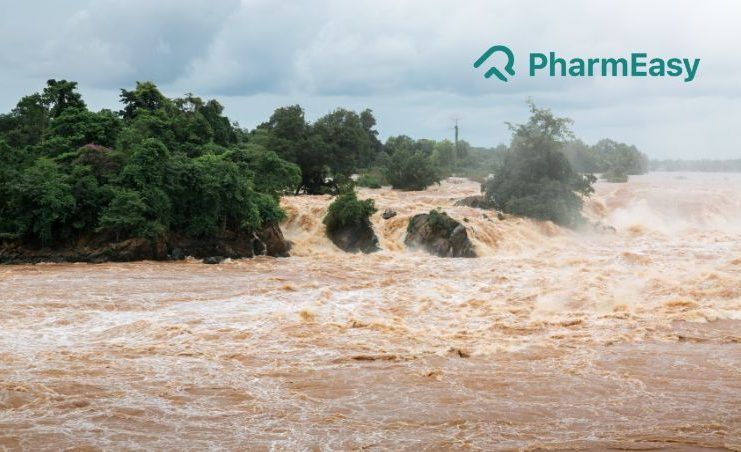Introduction
Recently, the cyclone in Chennai led to a flood-like situation, creating a lot of hassle and disruption in people’s daily lives. Apart from materialistic losses, flooding of water brings with it various health risks like an increase in vector-borne diseases, typhoid, jaundice, snakebites, electrocution, etc. While the government and local authorities are doing their very best to improve their alert and evacuation systems, making them more efficient, people are also expected to follow certain preventive measures for floods so that their well-being is not compromised.
How to Prepare Before a Flood?
The following are certain flood precautionary measures that you should consider prior to a heavy downpour.
- Keep checking for weather forecasts and news for updates on the newspaper, television or radio.
- Consider moving to a higher location for a few days.
- Shift important documents, possessions or antique furniture somewhere safe.
- Keep handy- drinking water, supply of essential medications, torch, non-perishable foods, dental items, etc.
- You should also arrange for floating equipment such as rings, safety jackets and more.
- If it ever looks to you that evacuation will be necessary, you should turn off the main power switch for all utilities.
What to Do During a Flood?
When a flood situation arises in a region, you should abide by the following measures in order to avoid panic and chaos:
- Follow the advisory rules as mentioned by the government authorities at that time.
- Do not step out in the flowing water unless you have been instructed to do so by the evacuation team.
- Stay connected with your friends and family.
- Do not touch or step out in the water or wet floor if there is a risk of any live wire that may be floating/ touching the water because there remains a risk of electrocution.
- Eat and drink hygienic and safe meals.
- Be mentally and physically prepared to evacuate if the need arises.
- Do not wait for instructions when there is flash flooding. Instead, move immediately to a place on higher ground.
- Do not drive where areas are flooded, as vehicles can easily be swept away.
What to do After the Flood?
This is a scenario where everything, including your home, is flooded. There are many dangers, so you need to keep in mind a few things:
- Clean and disinfect your home as well as your surroundings
- There is a high risk of fungal infections as well as mosquito breeding grounds, which need to be ably managed (spraying disinfectants, repellants, etc.)
- Do not drive through areas that are probably flooded.
- Be careful about areas of your neighbourhood, locality or city where the flood water has receded because floodwaters end up eroding walkways and roads.
How to Clean and Repair Home
Post a flood, cleaning and repairing one’s home is a very important first step with respect to returning to normal life:
- The electricity should be turned off at the fuse box. This helps a person to decide if their home is dry enough to turn the electricity back on.
- Remove any debris in the house brought by the flood waters.
- If household items such as carpeting or pieces of furniture have been damaged during the flood, you should clean and dry them within 48 hours. If you cannot dry them, you should discard them, as chances are these are already mouldy.
- Remove floorings such as sheet vinyl, ceramic tile, laminate and solid wood because the possibility is that moisture has collected underneath, causing bacteria to grow. Once these are discarded, you should ensure that everything is dry and clean.
How to Maintain Health & Hygiene
- During and after a flood, there are increased chances of vector-borne and water-borne diseases such as dengue, malaria, cholera, typhoid fever, gastroenteritis, food poisoning, flu and others. It is important to know the risks and protect the water sources-. You should use and consume boiled and treated water for the purpose of drinking and preparing food at all times.
- Never use the flood water to carry out any cleaning activity, such as washing your clothes or dishes or preparing food. Always wash your hands with soap and water thoroughly if you come in contact with floodwater.
- If any food item in your home has come into contact with floodwater, it should be thrown away because it is not safe to consume it any longer.
- If there continues to exist standing or stagnant water in your locality or neighbourhood, you should use mosquito repellents on your skin and clothes. Use mosquito nets to cover your bed when you are sleeping at night.
Conclusion
If you live in a zone or area which is prone to flooding every year, you should stay well-informed about the types of flooding that can impact and harm your home and community. Such flooding includes river floods, flash floods, coastal floods, storm surges and more. A flood situation can be violent and cause immense damage to public property and health. So, it is important that on the individual level, you need to take proper and necessary flood safety measures to protect your life, health and your home and belongings.
Make sure to keep a check on your neighbours and also help those in need.
Disclaimer: The information included on this site is for educational purposes only and is not intended to be a substitute for medical treatment by a healthcare professional. Because of unique individual needs, the reader should consult their physician to determine the appropriateness of the information for the reader’s situation.










Comments